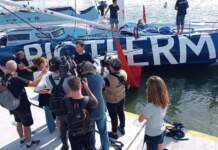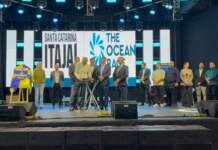
With a commitment to put sustainability at its heart, the next edition of the ultimate fully crewed around the world yacht race has unveiled a roadmap to inspire action and create tangible outcomes for ocean health.
Johan Salén addresses the Our Ocean Conference in Bali on the subject of the future sustainability commitments of the race.
Co-president Johan Salén revealed the set of commitments at the fifth Our Ocean conference in Bali, Indonesia.
Mr Salén announced that the future work of the organisation would build upon the legacy of the last edition of the race to tackle ocean pollution, by implementing an ambitious Sustainability Programme.
Over the next four years our ambition is to deliver the Sustainability Programme in collaboration with a broad range of stakeholders, including 11th Hour Racing and UN Environment.
Mr Salén said: “By providing leadership and engaging our sailing teams, stakeholders, suppliers and host cities, our clear objective is to deliver a race with sustainability at its core.
“We will advocate for global solutions to the issues connected to marine plastic pollution, supported by institutions, governments, corporate partners and philanthropists.”
Johan Salén (L) and Erik Solheim at the Our Ocean Conference in Bali, where an MoU between The Ocean Race and UN Environment was signed
The Sustainability Programme will continue the vital work carried out during the last edition of the race by setting a high standard for the integration of sustainability within a high-profile sporting event.
The new programme will feature a series of ten high level Ocean Summits and Innovation Workshops to engage with key influencers to explore industry-led solutions.
The initiative is to be guided by the UN Sustainable Development Goals (SDGs) and aims to integrate a circular economy approach to policy and business models for impactful systemic change.
The successful curriculum-based Education Programme will use the race as a template to provide unique insight and provide imaginative modules that supply children with the key resources to take action to help combat the plastic crisis affecting our seas.
With input from schoolchildren, this programme is to be extended to include a secondary school element, incorporating Science, Technology, Engineering, Arts and Maths elements.
In collaboration with a scientific consortium, groundbreaking microplastic data from seawater samples, collected during the 2017-18 edition of the race, will be used to contribute to the development of an internationally standardised process for ocean sampling and analysis.
There is little information on the links between plastics and human health. Therefore, the programme aims to utilise cutting edge technology that provides valuable data on their potential effects on people.

Anne-Cecile Turner, Sustainability Programme Leader, added: “We are committed to using the momentum gained during the last race to drive action across a range of areas to restore ocean health.
“By using the power of the sport of sailing we aim to showcase best practice and share our vision with politicians, businesses and the scientific community that ultimately accelerates positive change.”
“The impact of the Sustainability Programme in the last edition of the race has been outstanding – we now have a comprehensive set of data that highlights the successes of each area, from operations, to education, science research, community engagement and global commitments towards ocean health. We are thrilled to support the legacy of this Programme and to develop, together with the organizers, a renewed strategy and detailed roadmap ahead of the next race,” commented Todd McGuire, Program Director, 11th Hour Racing.
The international Sustainability Programme will run through to the next edition of the race, which will start in 2021 and end in 2022.
The Bali conference focussed on solutions to the key issues affecting our seas including marine pollution, marine protected areas, sustainable fisheries and climate-related impacts.












